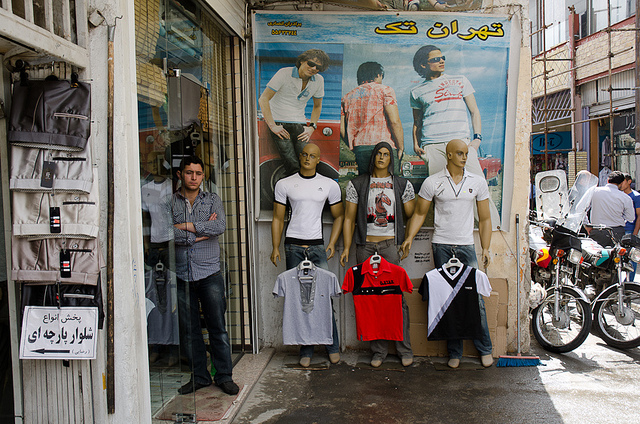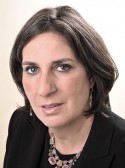
Back when relations between the United States and Iran were really bad, not just kind of bad, the Ayatollah Khomeini called the United States the “Great Satan” and a “wounded snake.” Today, things are looking up. Newly elected president Hassan Rouhani had a cordial phone call with President Obama, and negotiations to prevent Iran from enriching uranium for the construction of nuclear weapons are moving forward. So perhaps it’s time for a new set of nicknames. In advance of a Zócalo/Occidental College event, “Is Iran About to Become Our New Best Friend?”, we reached out to several people who study Iran for their thoughts on what is happening in that nation today. Specifically, in honor of former two-word nicknames, we wanted to know the following: What two words would you employ for Iran at this particular moment in time and why?

Although the past three and a half decades have been characterized by mistrust on the part of the governments of Iran and United States, I believe the U.S. has an important opportunity, and dare I say, obligation, to respond to the gesture offered by Iran’s newly elected president, Hassan Rouhani. This past August, we marked the sixtieth anniversary of the CIA-backed military coup that toppled Iran’s democratically elected Prime Minister Mohammad Mossadegh, whose ouster contributed to the state of affairs we have with Iran today.
Despite efforts by factions within the U.S. Congress and Israel’s Prime Minister Netanyahu to campaign for military action against Iran, only dedicated and laborious diplomacy will end the hostilities between Iran and the U.S. and put these nations on a path to becoming acquaintances and, over time, perhaps friends. Without diplomacy, we stand to lose one of the best possible allies in a region that is embroiled in war and a rising tide of extremism.
Iran, while crippled by sanctions and other problems, is still one of the more stable nations in the region. It has a majority population of young people who want to be in closer contact with the world and the U.S. When we consider what is taking place in Syria and Egypt, we should ask ourselves, “Wouldn’t it be nice to work on winning a few friends—particularly in a place where a war has not already been unleashed?”
Iran is a regional power and a power broker in places like Iraq and Syria, and even with our concerns about Iran’s nuclear ambitions and abysmal human rights record, we should be doing everything we can to work with the country to avoid involvement in another costly and endless war that will lead to only greater instability and extremism in the region. Diplomacy is hard work, but the alternative has shown itself to be far too costly, no?
Persis Karim is editor and contributing author to Tremors: New Fiction by Iranian American Writers and Let Me Tell You Where I’ve Been: New Writing by Women of the Iranian Diaspora. She is a professor of English & Comparative Literature at San Jose State University where she also co-directs the Persian Studies program and coordinates the Middle East Studies program.

For over twenty years, Hassan Rouhani, Iran’s new president, was the talented but discreet right-hand man of Ali Akbar Hashemi-Rafsanjani, who was, until Ali Khamenei, Ayatollah Ruhollah Khomeini’s successor, downed him, the major domo of Iran’s political clergy. Rafsanjani drove the Islamic Republic’s nuclear program from its inception in the 1980s throughout much of the 1990s. Western intelligence services know from defecting engineers and scientists, among other sources, that the ruling mullahs have always aimed for developing missile-delivered nuclear arms. As is the case with the numerous terrorist operations undertaken by Iran when Rafsanjani was the dominant voice in the regime’s Supreme National Security Council, Iran’s Manhattan Project is a significant accomplishment of Rouhani’s alliance with Rafsanjani.
It’s possible, of course, that Rouhani has had an epiphany, that he now believes his work on the nuclear-weapons program was a mistake, given the economic pain of sanctions. But it would be an enormous about-face for him. Such arms were designed to ensure that the republic and its revolution would never have to kowtow to the West, and there’s nothing in Rouhani’s written record that justifies any optimism about his commitment to halting the program.
Rouhani was the personal representative of Khamenei on the Supreme National Security Council from 2005 until his election, and he has never fessed up about the militarization of the nuclear program. His campaign statements on the atomic question, and especially his memoir that recounts his time as Iran’s nuclear negotiator in the wake of America’s invasion of Iraq, depict a mullah who firmly believes that he advanced the regime’s ambitions cleverly, with none of the counterproductive, sanctions-producing histrionics of Ahmadinejad and his men.
A critical observer would have to conclude that the odds are high that Rouhani is lying. What he really wants—what Khamenei and the powerful Revolutionary Guards want—is the bomb and sanctions relief delivered via deceptive negotiations with a war-weary West.
Reuel Marc Gerecht, a former Iranian-targets officer in the CIA’s Clandestine Service, is a senior fellow at the Foundation for Defense of Democracies.

The Islamic Republic of Iran is a weak country with an unpopular ruling regime. It suffers from more than 20 percent unemployment and rampant inflation. It has an outdated military and is threatened by conflict on almost every border. Yet Iran is an incredibly effective international player.
Let’s look at Iran’s recent victories:
Immediately following Iran’s presidential elections in June, the White House released a statement: “We respect the vote of the Iranian people and congratulate them for their participation in the political process, and their courage in making their voices heard.” The elections secured this endorsement even though Iran has no free media, no legal political opposition organizations, and no independent election observers.
Second, Iran has put up its number-two leader, President Hassan Rouhani—rather than its top official, Ali Khamenei—to negotiate nuclear proliferation issues with President Obama. Supreme Leader Khamenei is the main source of power in Iran and oversees all security and military issues; the president coordinates day-to-day governmental affairs. The fact that the U.S. president is negotiating nuclear issues with President Rouhani is akin to Obama engaging on such matters with the Queen of England rather than Prime Minister Cameron.
Next, the West seems to buy into the proposition that Iran is a powerful state, even though it lacks a strong and credible military. Iran has not acquired any major weapons systems in more than 30 years, and its air force and air defenses are in tatters. Yet Iran continues to hold the West hostage over the threat of nuclear weapons acquisition.
In this risky game, Iran has proven itself a master strategist that, so far, has been able to outrun the most powerful players.
Brenda Shaffer is a visiting researcher at Georgetown University on sabbatical from the University of Haifa, where she is a professor of Political Science. She is the author of the books Energy Politics (University of Pennsylvania Press, 2009) and Borders and Brethren: Iran and the Challenge of Azerbaijani Identity (MIT Press, 2002).



